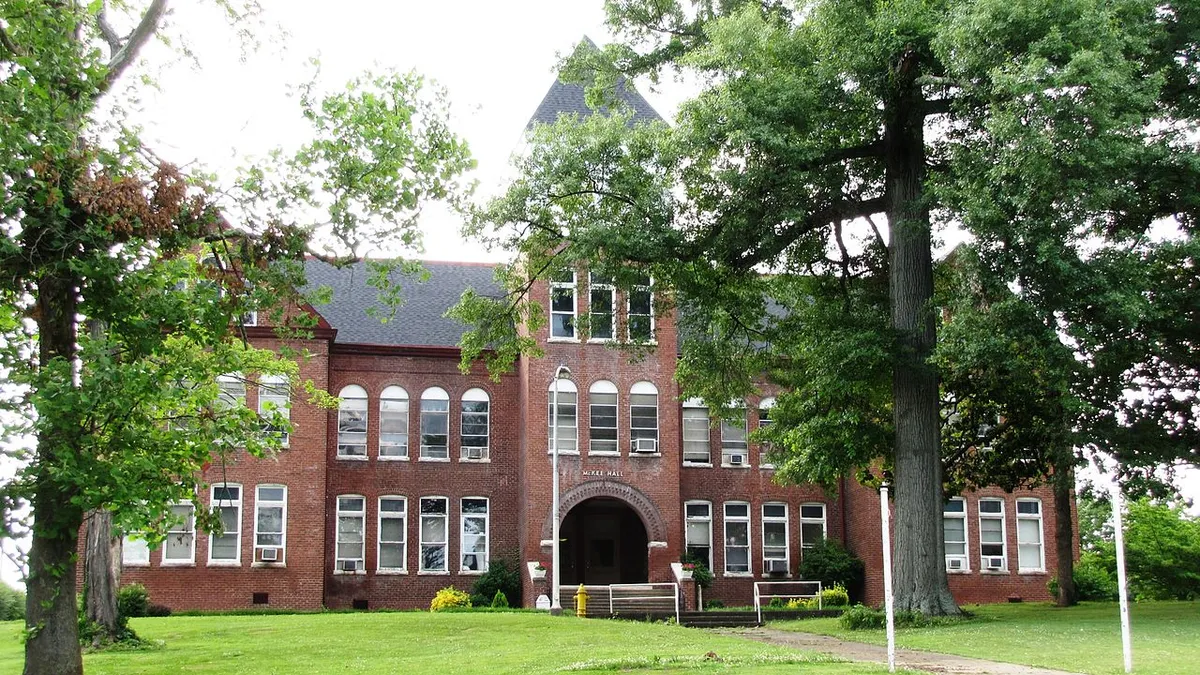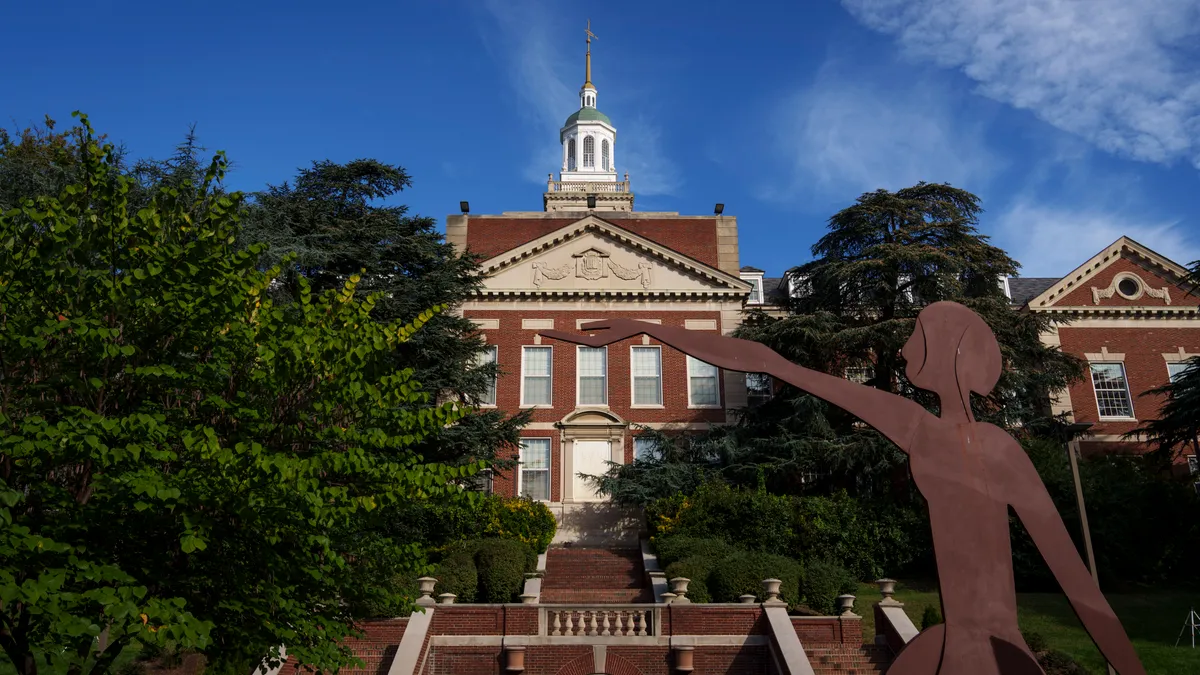When Knoxville College, a small, private historically black college in eastern Tennessee, closed following the conclusion of the spring semester in 2015, few were surprised. Though Knoxville is home to the University of Tennessee’s flagship campus and industry and businesses are returning to the region, the median household income in the city’s majority black neighborhoods of Morningside and Park City is only one-fourth as much in Morningside and one-half as much in Park City as the city median, which is still a low $44,000. College Hills, the neighborhood where the Knoxville College campus sits, though slightly more integrated, also has a median household income of roughly $23,000.
All Knoxville College buildings are either condemned or in need of severe physical maintenance, although brilliant stained glass windows can still be seen in McMillan Chapel. And hand-constructed columns and archways, many built by the freed slaves the institution was founded to educate, still stand as reminders of the importance the institution once held for the eastern Tennessee community of freedmen and their descendants.
Lois Williams, who served as president for 18 months between 1994 and 1995, said, “The legacy of the institution is what drives the black people in that area, because they have nothing else, historically, to cling to. They’re as committed to the college as they are going to church, or as they are to God, but they just don’t have the resources to help the college.”
When she was there, Williams said members of the community would come cut the grass and try to help with other repairs to keep the college going, but for the most part, alumni and local residents didn’t have much money to keep the institution open. Even the Presbyterian church, which had founded the institution, she said, stopped supporting the institution financially, giving only a couple hundred dollars in 1995.
But just as many saw the college’s decline coming, current interim President Keith Lindsey believes they should have foreseen a resurgence. “HBCUs, much like our history, we’re built on our resilience,” he said.
Last month, Knoxville College leaders received reauthorization from Tennessee’s Higher Education Commission to begin offering classes again. Initially the college is authorized to offer an online associate of arts degree in general studies, but Lindsey hopes to eventually re-open the physical campus and offer online and traditional brick-and-mortar classes.
But that won’t be easy.
“When I came there, residential facilities were unkempt, leaking, leaky roofs, buildings that needed to be renovated, Williams said.
The historic district, as Knoxville’s campus is now known, had become a hazardous waste zone because of improper disposal of chemicals from the chemistry lab on campus, but it avoided the dreaded Superfund designation that would have presented even greater challenges to fundraising efforts. Still, there’s much work to be done before it can house students.
But the college’s leader remains hopeful that it can again open its doors again. Lindsey declined to answer questions around how much money has been raised toward the re-opening effort or the sources donated, but is confident they have enough to recruit faculty and begin teaching classes this fall. Tennessee's Higher Education Commission did not require a financial statement — not even a rudimentary accounting of assets and liabilities — from the institution prior to granting re-authorization, sources told Education Dive. A former community organizer for the state of Tennessee, Lindsey said he is leveraging contacts, repairing old and existing relationships and forging new ones to get the college back on its feet.
Finding the right partners
“I think it’s important for people to know that in this rebuilding ... it’s not a microwave effect,” Lindsey said. “Because it’s open, it doesn’t necessarily mean you’re going to see instantaneous results. But it does mean that we have to stay steady. We have to remain vigilant, we have to stay diligent to the plan that we’ve started.”
According to Williams, faculty members at the University of Tennessee stepped in to help when she was president, offering to teach courses and provide some administrative oversight. But more than two decades later, the college is almost starting from scratch to repair relationships and establish articulation agreements with other institutions, while looking for community partnerships to help fortify its mission and provide resources to serve its students.
One proposed partnership is with the city of Knoxville to either purchase or rent some land on campus to install a new police headquarters and possibly a space for the fire department. According to Brittany Mosby, Tennessee’s new director of HBCU success, the proposed “safety center” is “a little bit controversial” because of concerns about over policing in the surrounding predominantly black neighborhood. (Shaw University faced similar concerns last year when the Raleigh HBCU sought to bring a police substation on campus, which then-President Tashni-Ann Dubroy hoped would boost police-community relations while improving campus safety. Ultimately stakeholders said no.)
According to Mosby, Knoxville College would provide diversity training and implicit bias training to the police department, which administrators hope would quell some concerns about police-community relations. The initiative also would provide an opportunity for college staff to serve as subject-matter experts on the sensitive topic affecting their community.
Focusing on students
The foremost challenge facing the institution in the immediate future is recruiting students and faculty members to campus. While Knoxville is authorized to begin offering classes in the fall, it still does not have regional accreditation, which will likely prove to be a hurdle. Lindsey said the college, through private fundraising, does have enough money to get started, but emphasized that budgets are built around enrollment, and the institution has no idea how many students it will enroll.
Williams lamented about the very narrow focus of enrollment two decades ago, and Lindsey agreed: “I don’t think looking at a model for just one type of student is the goal — the goal is for all students to take advantage of the educational opportunities at Knoxville College.”
The hope is that the totally online nature of the initial program will help with this. For a generation of incoming students who are technology natives, Lindsey said, online learning should be a fit. A recent study showed online learning may be more beneficial to students of color, especially first-generation college students. And online programs, particularly at for-profits, have long been a draw for adult learners who may need the flexibility to work or care for family in addition to attending college.
“It gives us a unique position to be able to educate a wider range of people who may have been left out from a traditional brick-and-mortar institution,” he said. “However, that’s not where we want to stay,” he continued, emphasizing that the ultimate goal is to re-open the campus doors and offer a hybrid education that can meet students’ needs whether they want to study online or in person.
Institutional leaders are planning to implement an aggressive coaching-mentoring model with online students, so each one has a personal online coach or mentor to help walk him or her through the process of completing a degree, which Mosby points out is “one of the things that HBCUs are known for, providing that personal touch.”
Lindsey said the biggest challenge ahead is “not letting go of the momentum that we’ve gained. As the college makes progress, you don’t ever want the wind to blow out of your sail. Continue to build on the excellent progress that we’ve made, continue to build on the partnerships that we’re forming.”
The authorization from the state of Tennessee to hold classes was “the culmination of a lot of hard work that has gone to revitalizing the college — but it’s only the first step,” he said. “We still have the task of continuing to rebuild the college based on our strategic plan and to take it to the next level.”









